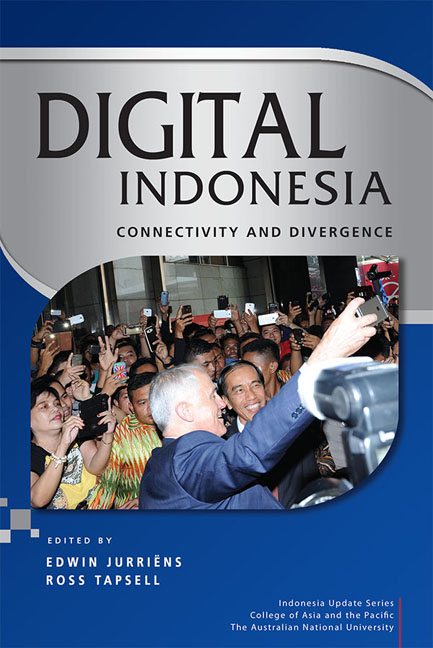Book contents
- Frontmatter
- Contents
- Tables
- Figures
- Contributors
- Acknowledgments
- Glossary
- Map of Indonesia
- 1 Challenges and opportunities of the digital ‘revolution’ in Indonesia
- PART 1 CONNECTIVITY
- PART 2 DIVERGENCE
- PART 3 IDENTITY
- PART 4 KNOWLEDGE
- PART 5 COMMERCE
- 13 Indonesia and the digital economy: creative destruction, opportunities and challenges
- 14 A recent history of the Indonesian e-commerce industry: an insider's account
- 15 The Go-Jek effect
- Index
- Indonesia Update Series
13 - Indonesia and the digital economy: creative destruction, opportunities and challenges
from PART 5 - COMMERCE
Published online by Cambridge University Press: 12 January 2018
- Frontmatter
- Contents
- Tables
- Figures
- Contributors
- Acknowledgments
- Glossary
- Map of Indonesia
- 1 Challenges and opportunities of the digital ‘revolution’ in Indonesia
- PART 1 CONNECTIVITY
- PART 2 DIVERGENCE
- PART 3 IDENTITY
- PART 4 KNOWLEDGE
- PART 5 COMMERCE
- 13 Indonesia and the digital economy: creative destruction, opportunities and challenges
- 14 A recent history of the Indonesian e-commerce industry: an insider's account
- 15 The Go-Jek effect
- Index
- Indonesia Update Series
Summary
The digital economy has multifaceted, sweeping yet wildly unpredictable effects on society (Eisenmann 2016). In addition to its economic impact, digitalisation can have cascading and transformative impacts on environment, education, health and governance. The digital economy can be defined as ‘the economic activity that results from billions of everyday online connections among people, businesses, devices, data, and processes’; the smooth functioning of the digital economy depends on hyperconnectivity, referring to the ‘growing interconnectedness of people, organisations, and machines that results from the Internet, mobile technology and the internet of things’ (Deloitte n.d.). Inextricably inter-twined with any definition of the digital economy is the notion of the sharing economy, that is, the use of the internet to facilitate peer-to-peer, rather than firm-centred, commercial exchanges (Belk 2014; Hamari, Sjöklint and Ukkonen 2015; Sundararajan 2016).
The introduction of new technologies has affected economies and societies many times during the course of human history. What is different about digitalisation is the unprecedented speed of the changes in digital technologies and their widespread impact. To be as well prepared as they can be, countries like Indonesia need to understand what the digital economy is and what the impacts are likely to be. This can help them make informed policy and business decisions that prepare the way for the adoption of technological innovations while safeguarding against the risks.
This chapter discusses the potential for the digital economy to generate ‘creative destruction’. First coined by Schumpeter (1934, 1950), this term describes how innovations can revolutionise economic structures by increasing productivity and efficiency, but in the process destroy traditional industries and business models. Creative destruction can be disruptive but it is considered an essential part of economic growth.
First, we provide a conceptual framework for the digital economy and look at how digitalisation fundamentally affects economic activity by reducing market frictions and inefficiencies in ways that are not available in the non-digital environment. Second, we review the available data to identify trends in the digital economy in Indonesia. Third, we provide some preliminary estimates of the impact of the digital economy on the overall economy and on productivity, efficiency, inclusiveness and innovation. We also provide examples of how business models are changing, including some that highlight the potential of the digital economy to promote inclusion.
- Type
- Chapter
- Information
- Digital IndonesiaConnectivity and Divergence, pp. 227 - 255Publisher: ISEAS–Yusof Ishak InstitutePrint publication year: 2017



